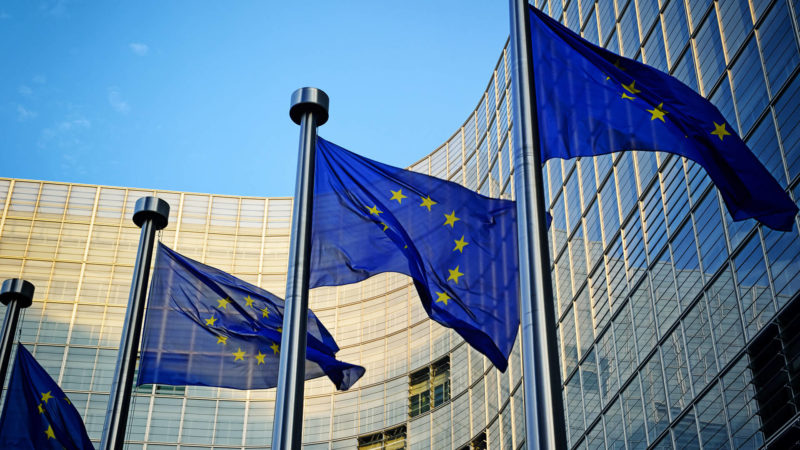Europeans Have Authority To Seek Google Break Up Though Unlikely To Do So
Break Google up. That’s the thrust of a “non-binding” resolution the European Parliament is expected to adopt at some point in the near future, according to a report on Friday from Reuters. The recommendation is likely to be to separate Google’s search engine from the rest of the business. Needless to say, if this were to come to pass it […]

Break Google up. That’s the thrust of a “non-binding” resolution the European Parliament is expected to adopt at some point in the near future, according to a report on Friday from Reuters.
The recommendation is likely to be to separate Google’s search engine from the rest of the business. Needless to say, if this were to come to pass it would be hugely damaging for Google. Reuters saw a draft of the resolution and reported the following Friday:
The motion seen by Reuters “calls on the Commission to consider proposals with the aim of unbundling search engines from other commercial services as one potential long-term solution” to leveling the competitive playing field.
Many people in the US scoffed and scratched their heads when they read this last week. While the European Parliament can’t order the breakup of Google, and so the resolution would be symbolic, the move represents an escalation of anti-Google sentiment and rhetoric. It also puts real, additional pressure on the European Commission (EC), which is at the center of the antitrust dispute.
The EC does have sweeping authority to deal with antitrust violations in Europe, including fines and “structural remedies.” For the past two years the Commission has been trying to reach a voluntary settlement with Google — unsuccessfully. We’ve written about these many attempts multiple times.
Former EC chief Joaquín Almunia left office on November 1 without a settlement, though several times in the past he thought he had one that would work for all parties. Persistent opposition by a variety of coordinated interest groups and companies including Microsoft, Yelp, TripAdvisor and others managed to thwart the various settlement proposals through lobbying and very vocal opposition.
Using a variety of studies and surveys, they criticized the succession of settlement proposals as ineffectual.
Now it falls to Margrethe Vestager, a former Danish government minister, who has taken over at the helm of the EC to pick up where Almunia left off. She has not made her views on Google known and has indicated several times that she’s going to study the situation and take a deliberative approach.
But pressure is building, as indicated by the potential European Parliament resolution. Throughout Europe anti-Google copyright legislation is being adopted. These moves in most instances unfairly scapegoat Google as the cause of domestic newspaper industry problems.
Without going into technical-legal details, the EC has two types of antitrust remedies available: “commitment” and “prohibition” or “structural” remedies. The former is a voluntary agreement by a company to do or not do something. The current, proposed Google settlement falls into this category.
A structural or prohibition remedy is one that is imposed by the EC after a finding of an antitrust violation, which has not yet been found in this case. A structural remedy can include fines but also divestitures — meaning it can call for companies to be “broken up.” Thus, in answer to those who question whether the EC has the authority to “break up Google,” at least in theory it does.
As has been reported multiple times the EC can impose billions in fines on Google as well. There are lots of enforcement options the Commission has at its disposal. Voluntary or commitment remedies are most desirable to all parties. But the EC has imposed prohibition/structural remedies on more than a dozen occasions in the past decade or so.
In 2009 the EC reached a voluntary agreement with Microsoft about the company’s alleged abuse of power regarding its Explorer (IE) browser. The company committed to “un-tie” IE to the Windows operating system, among a few other things. In 2013 the EC fined Microsoft nearly $700 million for failing to fully comply with its earlier settlement commitments.
US regulators found that Google search was not a monopoly and declined to pursue a sweeping structural remedy against the company. Thus a decision to try and separate Google’s search business from other parts of the company would be difficult to accomplish on multiple levels and would only pertain to the company’s European operations, adding further complexity.
Vestager is likely to recognize the practical and legal challenges of what the European Parliament is calling for. It’s unlikely then that she and her organization will go down that path. But they also probably know the current settlement proposal is dead.
It’s now self-evident that something more “demanding” of Google will be required. But what that will be is not yet clear.
Contributing authors are invited to create content for Search Engine Land and are chosen for their expertise and contribution to the search community. Our contributors work under the oversight of the editorial staff and contributions are checked for quality and relevance to our readers. The opinions they express are their own.
Related stories
New on Search Engine Land